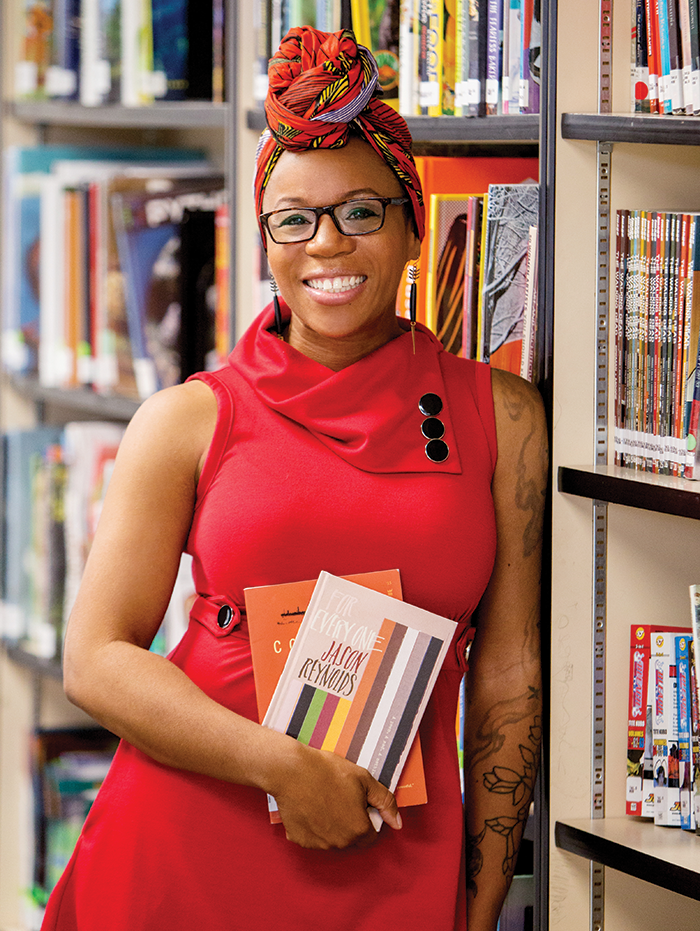As a teacher librarian, Julia Torres collects and shares resources, develops and leads professional development for educators, collaborates with teachers, encourages student literacies and advocates for school libraries.
How did you become a teacher librarian?
I am an English teacher serving as a librarian, which is very different from someone who has a master’s degree in library science. We had no library on campus for several years, so, to meet my students’ needs, I developed a classroom library that was really strong and robust with diverse titles to pique their interest. In time, kids from different classes would come into my classroom to borrow books. I then started to get grants to inject more life into my classroom library through the addition of more (and better) titles.
One day, a friend from district library services came to visit my classroom and was impressed with what she saw. In short, my dedication and passion for matching students with just the right books came to their attention. It was revealed to me eventually that many people within the district, together with community members, had been working hard behind the scenes to get our library back. So, it was natural that I would be asked to be the teacher librarian on campus. I already knew the conditions under which our students and staff were operating.
What are your recommendations for building a classroom library?
I think we build libraries through the lens of our own experience. So right now it’s very trendy and popular for teachers to build libraries with culturally diverse texts. However, that means different things to different people. For some folks, it’s going to mean buying any book with a child of color on the cover in order to have the appearance of “representation.” For some, it’s going to mean buying anything that was positively reviewed by educators of color. For others, that’s going to mean buying exclusively #OwnVoices texts. ...
I personally do not want texts in my library that are written about the lives of people of color, featuring protagonists who are people of color, that are written by white authors unless I know the author, their process and background. I’ve read too many books where authors don’t have language or other details right because they’re writing from outside a culture or specific lived reality. The fact that someone has researched a specific identity extensively does not mean you know what it is to live in that skin. We are doing our students an injustice if we don’t think that they can identify the details that are missing or incorrect.
All teachers are pressed for time. I get it. But this is not work that can be done quickly or passed off to someone else. It is past time for us to become accustomed to asking ourselves how we are going to advocate for the inclusion of a text if it has been selected simply on the basis that it’s from a text list.
How is your work as a teacher librarian different from that of a teacher?
A lot of my work is helping folks understand how to do the work of disruption or reimagining. I prefer to call it reimagining these days. #DisruptTexts is a movement I’m a part of, a co-founder with Tricia Ebarvia, Lorena Germán and Dr. Kim Parker. I’m very proud of the work that has been done through that organization and movement because the community has changed the way people think and the actions they take regarding text selection and curriculum implementation.
In addition to participating in online communities and conversations that push thinking and practice, we have to consider ways we can reimagine how to do work within whatever context we are in, because there is something that can be done in wherever we are, and from any role in which we might be serving. What has been really great is that lately, teachers have started to come to me and say, “I’m not feeling this book that I’ve been told by the district I have to use. So what are my choices? How can we collaborate, language arts teacher and librarian, to assign something better? Because the response that I was getting from the students, whether it’s because of my teaching or because of the book, didn’t work.” I see this as an incredible opportunity for teachers and librarians to work together, leveraging the strengths of people in both roles to think in new ways and transform the way we think about what texts are worthy of academic study.
What’s the best part of your work?
The best part of my day is to book-talk books to kids. I basically sell without the exchange of money. If there is an exchange, it’s love for books and the development of a relationship with words, language, art. I sell books to kids all day, and I’m one of millions of librarians around the country that does that. I’m honored to be able to link arms with them because I feel like that’s the best job in the world. When I see a child book-talking the book that they just finished reading to another kid, that’s a heart-opening experience.
It’s so exciting when a book written by an author that represents voices that have been marginalized, underrepresented [or] discounted finds its way into the hands of one of my students and they feel seen. Let me tell you: There is no child thirsty for reading like one who has been denied the simple pleasures of a beautiful, culturally responsive, well-run library for as many years as our kids have been denied.
Julia Torres is a teacher librarian in Denver Public Schools and a co-founder of #Disrupt Texts, which aims to create “a more inclusive, representative and equitable language arts curriculum.”
Know an excellent administrator, librarian or counselor we should interview?
Tell us all about them.

